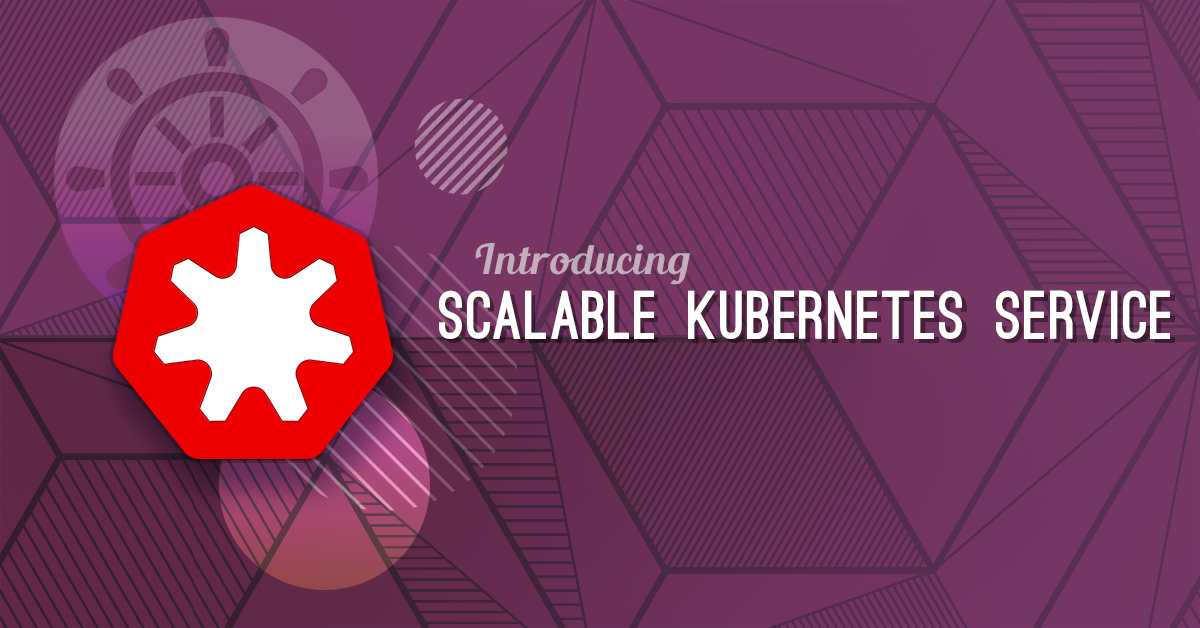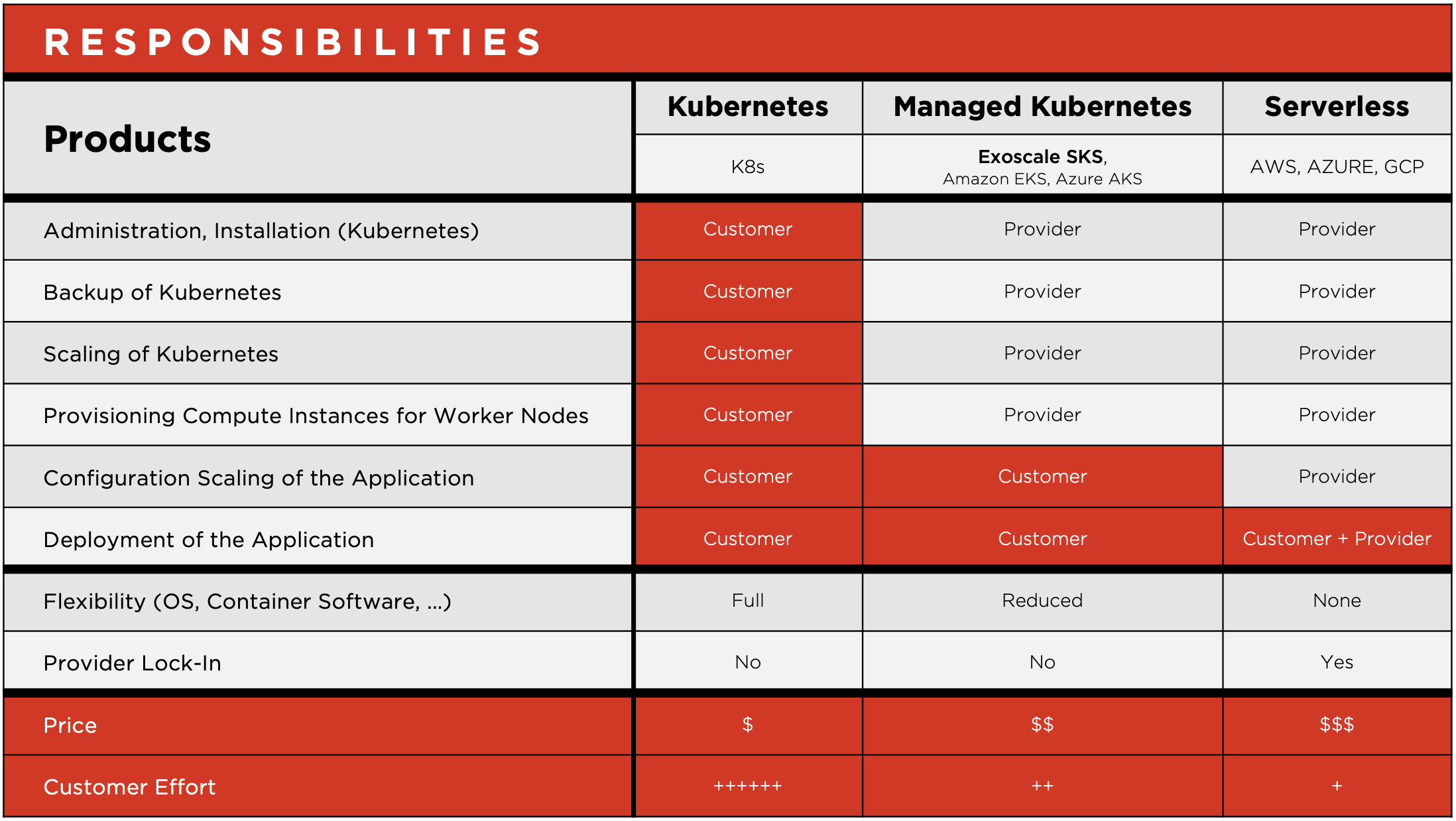Six months ago, we introduced our Scalable Kubernetes Service (SKS) on the Exoscale platform. Since the first day SKS has evolved further, and we are continuously working on improving the service and adding more features to it. We are today proud of announcing the official certification by the CNCF within the Certified Kubernetes Conformance Program. Read all about SKS, the latest developments and the roadmap for the next months.
Open Ecosystem SKS
The Exoscale Scalable Kubernetes Service (SKS) provides a managed container orchestration with full container lifecycle management, where SKS is built as an open ecosystem staying as close as possible to upstream Kubernetes project. With our approach we enable customers to bring their own CI/CD strategy and avoid lock-in to a specific vendor. By building our own Managed Kubernetes we remained true to our values: Simplicity, Scalability, Security.
SKS Official Certification
A major achievement has been the certification by the CNCF within the Certified Kubernetes Conformance Program in July. This certification guarantees total reversibility of data and ensures that our service supports the required APIs. Organizations and companies are therefore flexible in their providers’ choice and can set up multi or hybrid cloud environments easily.
Exoscale SKS has also been officially listed in the K8s documentation for NGINX ingress-controller. We are therefore amongst all well-known cloud providers.
This certification and listing are a result of our unceasing efforts to offer our customers a highly performant and easy to use Kubernetes service. SKS developed massively within the last months, for example by adding new features or supporting new Kubernetes versions.
SKS Evolution over the last Months
It all started in February 2021, when we released a preview version of our Kubernetes service with limited availability but full features. Already about a month later at the end of March 2021 we announced General Availability of the service, meaning that SLAs were fully enforced from this day and the web portal integration has been published. This step has been important in allowing customers to receive full support and relying on known service levels.
A major step has also been the Terraform Support in the official Exoscale Terraform Provider so it is easy to deploy an SKS cluster on Exoscale with Terraform.
Furthermore, we fully enforce full lifecycle management for SKS. Within the SKS lifecycle management our design goal is to make versions available within 2 weeks after their release. This aim has been met mostly in a shorter period by now. In April we were able to support Kubernetes versions 1.20.6 and 1.21. With July 2021 we quickly moved to support Kubernetes versions 1.20.9 and 1.21.3 only 5 days after their official release – which enables us to offer on-the-edge Kubernetes service to our customers.
SKS Feature Improvements
Not only are we keeping our service up to date to the latest versions, but we are also improving on the offered features and continuously adding more. Minor version upgrades on SKS are now on autopilot, you just need to set a flag on your cluster to get the automated upgrades to the control plane.
Metrics servers are already deployed by default on SKS. And we made it possible to use SKS evict to ease eviction of specific nodes for your upgrade scenarios.
We recently enabled support for private networks. Customers can now attach private networks to nodepools. All virtual machines belonging to these nodepools will automatically join the managed private networks. This feature is valuable for communication between applications running on Kubernetes and applications running on regular virtual machines.
To enhance organization of clusters and nodepools it is possible to add labels to them. Nodepool labels are also automatically passed on to associated instance pools and virtual machines. We additionally added instance prefixes to support organization and structuring. By default, virtual machines (workers) for SKS are named pool-<first 5 chars of the underlying instance pool id>-<5 random char>. The “pool”-prefix can now be replaced by something else, customizable by the customer.
An important feature we added recently is the support of dedicated hypervisors for nodepools. Users can run SKS nodepools on dedicated hypervisors by specifying the hypervisor group.
Find the full set of features within our SKS documentation and stay up to date with the latest developments.
Roadmap for the next Months
Within the next weeks and months, we will continue to work on our Kubernetes service to further improve it.
To give a better impression, what is coming up, we give you a sneak peek into our next developments to come:
- SKS support for GPUs
- Enabling of Single-Sign-On (SSO)
- Block Storage support for nodepools with Linstor CSI
- Kubernetes cluster autoscaler
The roadmap is steadily enhanced. We will share every new development on our channels, to keep you updated. Just follow us on our social media accounts (Twitter and LinkedIn), follow the changelog on our website or subscribe to our newsletter within the portal.



